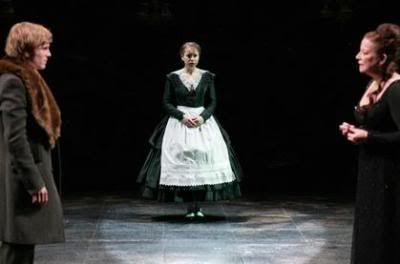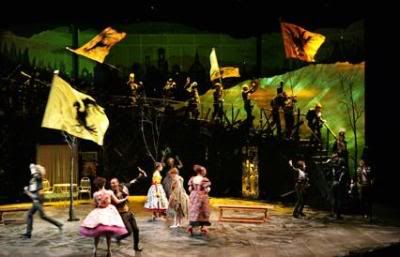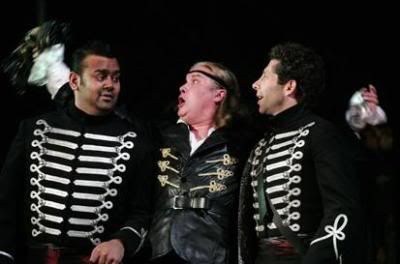 One Man, Two Guvnors, The Adelphi Theatre, 21.11.2011, 7pm
One Man, Two Guvnors, The Adelphi Theatre, 21.11.2011, 7pmOne Man, Two Guvnors, the latest sell-out sensation from The National Theatre, tells the complicated story of protagonist Francis Henshall and his misadventures as he struggles to hold down two jobs at the same time. Using Carlo Goldoni's 18th century comedy The Servant of Two Masters as source material, Richard Bean's script transposes the classic characters of the Commedia dell' arte tradition to vividly realised 1960s Brighton. The plot, which at first glance appears quite complicated, focuses on Francis (James Corden) and his relationship with respective employers. Guvnor number one, Roscoe Crabbe, is a dead ringer for Ringo Starr who hires Francis as his minder. Guvnor number two, Stanley Stubbers (a walking personification of the phrase 'jolly hockysticks' if ever there was one), engages Francis to be his dogsbody whilst on the run from the 'rozzers'. Throw in concurrent sub-plots involving star-crossed lovers, Francis' incessant desire to eat and severe miscommunication over the deadly diseases decimating the population of Dorking and you've got the recipe for an instant theatrical hit.
Richard Bean's text is, without a doubt, the crucial comic element of this production. The dialogue which he has crafted is witty, light and engaging, capturing an idiom which is quintessentially English. The beauty of the writing also lies in a level of subtlety- it's not knowingly funny and the cast never play any of their lines for laughs- which of course makes the dialogue all the more hilarious. Each line is also invested with a strong sense of character- no mean feat considering that the narrative features a collection of diverse characters, all with conflicting motivations and intentions. Whether it be Alan's soliloquy musing on the destiny of the humble bus, or Dolly's (Suzie Toase) lessons on love, the dialogue is always driven by character, and is therefore wholly believable.
The physical comedy too, is as much a source of humour as Bean's expertly crafted text. Nowhere is this better exemplified than in the much discussed scene at the end of Act One, which sees Francis literally spinning a succession of food-laden plates to keep both of his employers happy and in ignorance of his duplicity. The undoubted star of this particular scene is Tom Edden, who plays Alfie, an 87 year old waiter. Decrepit and doddering, Alfie's first appearance is more than a little reminiscent of Julie Walters' 'Two Soups' waitress from As Seen on TV, and offers the audience a master class in slapstick comedy.
Amongst the stellar cast, there is not one disappointing performance. James Corden, in the lead role, is utterly charming, slipping easily in and out of character during sporadic moments of interaction with the audience. Whilst Francis might not be too much of a departure from his best know role as Smithy in Gavin and Stacey, he seems completely at ease on the Adelphi stage, dealing expertly with moments of improvisation and delivering a performance which is energetic, endearing and wholeheartedly funny. Credit too must go to Oliver Chris, not least for delivering the blustering dialogue of Stanley Stubbers with such conviction. Jemima Rooper also deals extremely admirably with the challenges of her role (or roles, as it were, without wishing to spoil the ending!) It is credit to her skill and commitment that her performance never strays into the realm of caricature. As an ensemble, the cast has a palpable chemistry, and a clear understanding of the world of the play which is communicated perfectly to the audience throughout.
Clarity of direction and design, combined with a wonderful live skiffle band accompanying the action make this a fully-envisioned, lively and unforgettable production. Beg, steal or take up a second job to get a ticket!
One Man, Two Guvnors runs at The Adelphi Theatre until February 2012.
Have you seen One Man, Two Guvnors? If so, what did you think?
(Image credit: Google Images.)































